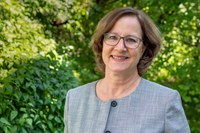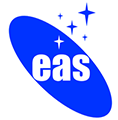Outstanding role in astronomy
Linda Tacconi from the Max Planck Institute for Extraterrestrial Physics in Garching (MPE), Germany, receives the 2024 Caroline Herschel Medal, a joint award from the Royal Astronomical Society (RAS) and the German Astronomical Society (Astronomische Gesellschaft, AG). The medal recognizes her world-leading observational studies of the cosmic evolution of dense, star-forming molecular gas in galaxies, as well as for her unique contributions to international leadership in astronomy, and service to the European astronomical community.
Linda Tacconi is a world-leading millimeter-wave Astronomer and highly outstanding scientist, who has made seminal contributions to the understanding of galaxy formation. After obtaining her PhD from the University of Massachusetts, USA, she established her career in Europe, first in the Netherlands, then in Germany where she has played a pivotal role in the IR/Submm group of MPE, and Deputy to the Director Reinhard Genzel.
Her research focuses on millimeter and submillimeter interferometry, along with high-resolution infrared imaging spectroscopy, to unravel the evolution of galaxies and their central black holes. Linda Tacconi has made significant contributions to our understanding of cosmic galaxy evolution over a wide range of spatial scales and cosmic epochs. Her research has highlighted the critical importance of the molecular interstellar medium and its intricate relationships with overall galaxy properties. Through combining ground-based and space-based telescope observations spanning from millimeter to infrared wavelengths, Linda Tacconi’s innovative research has unveiled that star-forming galaxies in earlier cosmic epochs contained much more molecular gas and exhibited accelerated rates of star formation compared to their contemporary counterparts. Furthermore, she has demonstrated that the evolution of cold molecular gas and galaxy-wide star formation is primarily governed by the rate of gas accretion.
Beyond her role at the MPE, Linda Tacconi has contributed significantly to various international committees. She has taken on unique leadership roles in the German, European and International astronomical community. Amongst those, she has chaired both the Programme Committee and the Science Advisory Committee of IRAM, a prominent international research institute dedicated to millimeter astronomy.
As the president of the European Southern Observatory council from 2021 to 2023, chair of the Atacama Large Millimeter/submillimeter Array board in 2021 and 2022, chair of the European Space Agency Voyage 2050 senior committee from 2019 to 2021, and Germany's representative on the ESO Council from 2016 to 2020, Linda Tacconi skillfully guided European Astronomy through the challenging circumstances of the pandemic, financial challenges, and political disruptions. Her exceptional service and leadership not only laid the basis for groundbreaking discoveries – ranging from nearby exoplanets to distant galaxies and black holes – but also ensured a steady course towards a promising future for astronomy worldwide. Her strategic vision remains instrumental in advancing projects such as the Extremely Large Telescope and forthcoming generation space missions.
Professor Mike Edmunds, president of the Royal Astronomical Society, said: “Dr Tacconi is an outstanding winner of the Caroline Herschel Medal. The field of candidates this year was very, very strong - a great tribute to the superb research work and community leadership that this award acknowledges.”
Professor Stefanie Walch-Gassner, president of the German Astronomical Society, said: “Linda Tacconi has made ground-breaking contributions to our understanding of how galaxies form and evolve over cosmic time, exploring these objects with detailed observations paired with impressive dedication. She is an outstanding and inspiring leader and mentor. We are proud to see her as a recipient of the Caroline Herschel Medal 2024."
The Caroline Herschel Medal introduced in 2021 by the UK Government, pays tribute to the esteemed legacy of former German Chancellor Angela Merkel. This prestigious medal honors Caroline Herschel, the renowned astronomer of the late eighteenth and early nineteenth centuries. Born in Hanover, Germany, Caroline Herschel relocated to the UK alongside her brother William, who notably served as the first president of the Royal Astronomical Society in 1820. Herschel's remarkable achievements include the discovery of eight comets, as well as the meticulous revision and significant improvement of catalogues of stars, clusters, and nebulae. The establishment of this medal symbolizes the enduring scientific collaboration between Germany and the UK, celebrating the profound contributions of Herschel and fostering recognition of outstanding women astronomers. Awarded on a rotational basis between the two countries each year, the medal underscores the shared heritage and continual collaboration in the field of astronomy.
Linda Tacconi will receive the Medal at a special ceremony at the British Embassy in Berlin, Germany on March 21, 2024. In 2025 it will be the turn of a woman astronomer in the UK to receive the Medal, and nominations for this will open later this year.
Contacts:
Dr Linda Tacconi
Max Planck Institute for Extraterrestrial Physics
Tel: +49 89 30000 3873
linda@mpe.mpg.de
Dr Janine Fohlmeister
Astronomische Gesellschaft
Tel: +49 331 7499 802
pressofficer@astronomische-gesellschaft.de
Sam Tonkin
Royal Astronomical Society
Mob: +44 (0)7802 877700
press@ras.ac.uk
Robert Massey
Royal Astronomical Society
Mob: +44 (0)7802 877699
press@ras.ac.uk
Notes for editors
The Royal Astronomical Society (RAS), founded in 1820, encourages and promotes the study of astronomy, solar-system science, geophysics and closely related branches of science. The RAS organises scientific meetings, publishes international research and review journals, recognises outstanding achievements by the award of medals and prizes, maintains an extensive library, supports education through grants and outreach activities and represents UK astronomy nationally and internationally. Its more than 4,000 members (Fellows), a third based overseas, include scientific researchers in universities, observatories and laboratories as well as historians of astronomy and others.
The RAS accepts papers for its journals based on the principle of peer review, in which fellow experts on the editorial boards accept the paper as worth considering. The Society issues press releases based on a similar principle, but the organisations and scientists concerned have overall responsibility for their content.
The German Astronomical Society (Astronomische Gesellschaft, or AG for short), founded in 1863, is the German national professional association for astronomy and astrophysics. The AG promotes activities in science and research, strengthens exchange between its members and supports the dissemination of science to the public and in education. On the international level, the AG represents the German astronomical scientific community in the European Astronomical Society (EAS) and the International Astronomical Union (IAU). The Council of German Observatories is a central body of the AG, acting as the science policy committee, and representing the common interests of all German astronomical institutions vis-à-vis funding agencies, governments, international organisations and other relevant boards and committees.




